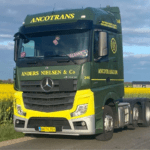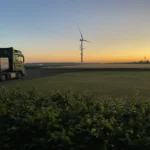Denmark likes diesel: Electrical trucks are the way forward – but hard to get going
Ancotrans participated in an interview about a greener future with electrical trucks. The original article was brought in www.erhvervplus.dk 20/9 in Danish. Link to the original Danish article.
Below you find the article translated into English.
Article by: Carsten B. Grubach CBG@erhvervplus.dk
Ancotrans wants to be greener, but the road towards driving electrical trucks is long and narrow. But despite many uncertainties, the large transportation company is betting on a new form for energy.
GLOSTRUP: Ancotrans is a leader in the Danish container road transportation market, and if anyone has the muscle to try new, more environmentally friendly forms of transport, it’s them.
Like so many others in the industry, Mogens Røigaard, COO at Ancotrans, headquartered in Glostrup and with branches in Hamburg, Rotterdam, Helsingborg, Cologne, Götenburg, Odense and Aarhus, has his eye on electrical trucks, which could be a good business in the long term.
“The customers are demanding it, but I don’t think it’ll be good business unless you combine electricity with hydrogen in the future. After all, we are in the heavy-duty segment with our trucks and have applied for subsidies for four electric trucks in Germany, four in Sweden and two in Denmark. We don’t have any at the moment, but Volvo is in the process of producing an electrical truck, which we expect to be able to put into operation in April next year.”
Mogens Røigaard, COO Ancotrans
“We have 213 own trucks and 875 subcontractors on the roads at the moment. The vast majority run on diesel, but we have some trucks in Germany that run on gas.
Volvo is producing a truck with a capacity of up to 540 kW. We will be able to actually use 70% of this when we drive with an average weight of 20 tonnes. That adds up to 1.33 kW per km. So we’re talking about a niche as there’s a limitation of 300 km per day, and we hold approvals to transport up to 44 tonnes”, says Mogens Røigaard.
While more and more electric cars are appearing on the roads, electrical trucks are few and far between in Denmark. According to bilstatistik.dk, 83 electric trucks were registered in Denmark this summer. The majority of them were vans over 3.5 tonnes and waste collection trucks.
Uncertainty around Danish support
Ancotrans applied for a grant from a Danish pool of DKK 50 million for the purchase of two electric trucks, which cost approximately three times as much as a regular truck – DKK 2 to 3 million.
“Subsidies of up to 40% of the price difference compared to an ordinary truck are on offer, but this depends on how many apply for grants from the pool. It could end up being 10–15%, so the actual scale of the support is uncertain”, says Mogens Røigaard, who would have liked to see Denmark set aside a larger amount and use other criteria, like in Germany and Sweden.
“The price of diesel goes up and down, but it’s nowhere near as volatile as the price of electricity. So right now, electrical trucks are a somewhat uncertain business model”, says Mogens Røigaard.
“The Germans set aside a lot more money, and support is given according to how many kilometres are driven, and the subsidy goes up to 80% of the difference compared to the price of a regular truck. There is also an 80% subsidy for superchargers and infrastructure, and there is no road tax on electric cars.
“In Sweden, support is either a fixed 40% of the price difference between the cars or 20% of the total price. It’s a fixed amount, while in Denmark you have up to 40%.”
The big joker in the energy game at the moment is the price of electricity, which is on the rise due to e.g. the war in Ukraine.
Mogens Røigaard regards the purchase of electrical trucks as an investment in a more sustainable future, because they will not make a good business in the short term.
1,450 daily transport services
Ancotrans is one of the country’s oldest family-owned and managed companies. The transport giant, which was founded in 1882, is currently helmed by the fifth generation.
Ancotrans has 1,450 daily transport services and 700 subcontractors, generated a turnover of around DKK 1 billion in 2021 and has around 400 full-time employees across offices in Gothenburg, Helsingborg, Copenhagen (Glostrup), Odense, Aarhus, Hamburg, Cologne, Rotterdam and Aalborg.
“Electrical trucks are so expensive, they have to be running eight to ten hours a day. It costs too much to charge via a supercharger at an external charging station, and it will work out much more expensive than a diesel truck So we have to base it all on charging at night, when electricity is cheapest. A supercharger that can charge up to 350 kW costs DKK 400,000, so there is also some infrastructure to consider.”
Mogens Røigaard, COO Ancotrans
Mogens Røigaard is aware that by investing in electric trucks, Ancotrans is embarking on a kind of pilot project.
“It won’t be a good business to begin with, but we don’t know whether the battery capacity will double over the next five years, or if the trucks will become cheaper to buy.”
Many unknown factors
“Truck manufacturers are betting heavily on the development of electrical trucks, but there are too many unknown factors for hauliers, which is why political help and direction are needed. There is uncertainty about charging infrastructure, prices for green fuels and trucks, the range of batteries and adaptation of driving patterns”, says Caroline Brüel, chief consultant at ITD, the industry organisation for Danish road freight transport.
Electrical trucks are so expensive, they have to be running eight to ten hours a day. It costs too much to charge via a supercharger at an external charging station, and it will work out much more expensive than a diesel car.
Like Mogens Røigaard, she sees a big challenge in the fact that an electric lorry is currently three times as expensive as a diesel lorry.
“This makes the investment unfeasible for the vast majority of hauliers – even when they are charged a kilometre-based tax that is lower for zero-emission trucks. But if the mileage tax is supplemented with support such as deductions that can easily and effectively help hauliers who invest in a climate-friendly truck, then it could really kick-start the green transition for heavy road transport”, says Caroline Brüel.
“We are calling on the government to come up with a comprehensive plan for restructuring heavy transport that not only looks at taxes, but also at how to support the hauliers’ investments in an easy and efficient way, just as has been done in Germany, Sweden, Norway and many other European countries.”
“Hauliers in Denmark end up being the black sheep on a European level. Danish hauliers must be able to access financial help for the transition on an equal footing with their colleagues in other countries, and not be left stranded because the Danish state is wearing blinkers”, the chief consultant points out.”
Green transportation options in Ancotrans
Want to know more about how we work with green transportation and your opportunities with Ancotrans?
Please don’t hesitate to contact Mogens Røigaard, COO Ancotrans.
+45 3915 9007
+45 4090 8207
mr@ancotrans.dk
www.ancotrans.dk






